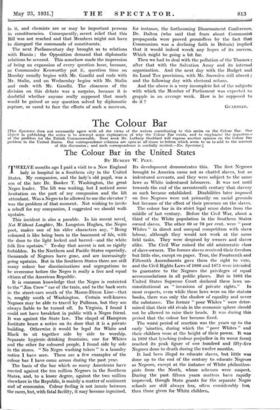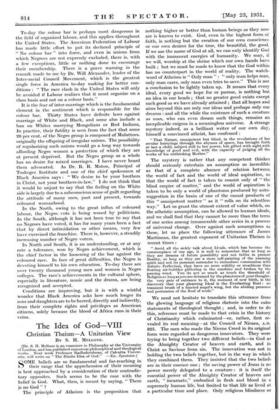The Colour Bar
[The Spectator: does not necessarily agree with all the views of the writers contributing to this series on the Colour Bar. Our object in publishing the series is to attempt some explanation of why the Colour Bar exists, and to emphasize the importance of the problem for the British Commonwealth. Next week Mr. Lothrop Stoddard will express another opinion on the Colour Bar problem in the United States. Our correspondence columns are open at all times to letters which seem to us to add to the interest of this discussion ; and such correspondence is cordially invited.—En. Spectator.]
The Colour Bar in the United States
BY HUBERT W. PEET.
rilVVELVE months ago I paid a visit to a New England 1 lady m hospital in a Southern city in the United States. My companion, and the lady's. old pupil, was a son of the. late Dr. Booker T. Washington, the great Negro leader. The lift was -waiting, but I noticed some hesitation on the part of my companion and the lift attendant. Was a Negro to be allowed to use the elevator? was the problem of that moment. Not wishing to invite a rebuff for my companion, I suggested we should walk upstairs.
This incident is also ,a parable. In his recent novel, Not. Without Laughter, Mr. Langston Hughes, the Negro poet, makes one of his elder characters say, .".Being coloured is like being born in the basement of life, with the door to the light locked and barred—and the white folk live upstairs." To-day that ascent is not so rigidly forbidden. In the Northern and Pacific States especially, thousands of Negroes have gone, and are increasingly going upstairs. But in the Southern States there are still many colour bar discriminations and segregations to be overcome before the Negro is really a free and equal citizen of the American Republic.
It is common knowledge that the Negro is restricted to the " Jim Crow " car of the train, and to the back seats in the street-cars south of the Mason-Dixon Line—that is, roughly south of Washington. Certain well-known Negroes may be able to travel by Pullman, but they are always liable to be turned off. In Virginia, I found I could not 'have breakfast in public with a Negro friend. It was against the State law. The chapel of Hampton Institute bears a notice on its door that it is a private building. Otherwise it would be legal for White and Black to sit together side by side to worship. Separate hygienic drinking fountains, one for Whites and the other for coloured people, I found side by side in the stores. " No Negro washing taken " is a laundry notice I have seen. These are a few examples of the colour bar I have come across during the past year.
The basis of the bar which so many Americans have erected against the ten million Negroes in the Southern States, and, to a lesser degree, against the two. million elsewhere in the Republic, is mainly a matter of sentiment and 'of economics. Colour feeling is not innate between the races, but, with fatal facility, it may become ingrained. Its development demonstrates this. The first Negroes brought to America came not as chattel slaves, but as indentured servants, and they were subject to the same laws as White indentured labourers. It was not until towards the end of the seventeenth century that slavery as such became established. Disabilities later imposed on free Negroes were not primarily on racial grounds but because of the effect of their presence on the slaves.
The colour bar in its strict legal sense dates from the middle of last century. Before the Civil War, about a third of the White population in the Southern States owned slaves. The other 60 or 70 per cent. were " poor Whites " in direct and unequal competition with slave labour, although they would not work at the same field tasks. They were despised by owners and slaves alike. The Civil War ruined the old aristocratic class of slave-owners. The former slaves received their freedom but little else, except on paper. True, the Fourteenth and Fifteenth Amendments gave them the right to vote, and the Civil Rights Laws of 1866 and 1875 were intended to guarantee to the Negroes the privileges of equal accommodations in all public places. But in 1883 the United States Supreme Court declared these laws un- constitutional as " invasions of private rights." In most respects, even while these laws were on the statute books, there was only the shadow of equality and never the substance. The former " poor Whites " were deter- mined that their old rivals in the economic sphere should not be allowed to raise their heads. It was during this period that the colour bar became fixed.
The worst period of reaction was the years up to the early 'nineties, during which the " poor Whites " and their children were at the height of their power. It was in 1892 that lynching (colour prejudice in its worst form) reached its peak figure of one hundred and fifty-five Negroes done to death during the twelve months.
It had been illegal to educate slaves, but little was done up to the end of the century to educate 'Negroes as Negroes, except at the instance of White philanthro- pists from the North, whose schemes were suspect. During the past fifteen years matters have rapidly improved, though State grants for the separate Negro schools are still always less, often considerably less, than those given for White children. To-day the colour bar is • perhaps most dangerous in the field of organized labour, and this applies throughout the United States. The American Federation of Labour has made little effort to put its declared principle of " No colour bar " into force, and even in unions from which Negroes are not expressly excluded, there is, with a few exceptions, little or nothing done to encourage their membership. There is a grave warning in the remark made to me by Dr. Will Alexander, leader of the Inter-racial Council Movement, which is the greatest single force in America to-day making for better con- ditions : " The race clash in the United States will only be avoided if Labour realizes that it must organize on a class basis and not on a colour basis."
It is the fear of inter-marriage which is the fundamental element in , the sentiment which is responsible for the colour bar. Thirty States have definite laws against marriage of White and Black, and some also include a ban on Whites marrying Mongolians or Red Indians, In practice, their futility is seen from the fact that some 20 per cent. of the Negro group is composed of Mulattoes. originally the offspring of irregular unions. The possibility of regularizing such unions would go a long way towards affording Negro women a protection of which they are at present deprived. But the Negro group as a whole has no desire for mixed marriages. I have never heard them advocated. As Dr. R. R. Moton, Principal of Tuskegee Institute and one of the chief spokesmen of Black America says : " We desire to be your brothers in Christ, not your brothers-in-law." I do not think that it would be unjust to say that the feeling on the White side is largely due to a subconscious sense of guilt regarding the attitude of many men, past and present, towards coloured womanhood.
In the North, owing to the great influx of coloured labour, the Negro. vote is being wooed by politicians. In the South, although it has not been true to say that no Negroes have voted, it has for many years been a fact that by direct intimidation or other means, very few have exercised the franchise. There is, however, a steadily increasing number of Negro voters.
In North and South, it is an understanding, or at any rate a tolerance, won by Negro achievement, which is the chief factor in the loosening of the bar against the coloured race. In face of great difficulties, the Negro is devoting himself to his own education. To-day there are over twenty thousand young men and women in Negro colleges. The race's achievements in the cultural sphere, especially in literature, music and the drama, are being recognized and accepted.
Conditions are improving, but it is with a wistful wonder that Black America asks how much longer its sons and daughters are to be barred, directly and indirectly, from their complete rights and privileges as American citizens, solely because the blood of Africa runs in their veins.







































 Previous page
Previous page